|
|
|
Sort Order |
|
|
|
Items / Page
|
|
|
|
|
|
|
| Srl | Item |
| 1 |
ID:
114866
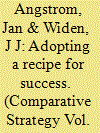

|
|
|
|
|
| Publication |
2012.
|
| Summary/Abstract |
The prevailing explanation of the institutionalization of the principles of war is misleading. Although the introduction of the principles into Western doctrine coincided with total war and the need to train unprecedented numbers of soldiers and junior officers in tactics, the fact that the principles disappeared from doctrines immediately prior to and during the Second World War suggests that they were not institutionalized to meet an increased need to educate the military. Instead, we test two other explanations: one drawing on the principles' military effectiveness and one drawing upon the principles' explanatory power. We find that neither one of these hypotheses stand. Instead, we conclude by elaborating on how the institutionalization of the principles of war can be made understandable using non-rationalist frameworks, in particular the growth of a particular kind of identity of staff officers in the late nineteenth and early twentieth century. According to this framework, the two world wars interrupted-rather than promoted-the institutionalization of the principles, since the wars with their large death tolls and mass recruitment increased the difficulties of creating a separate and unique identity for the burgeoning corps of staff officers.
|
|
|
|
|
|
|
|
|
|
|
|
|
|
|
|
| 2 |
ID:
120306
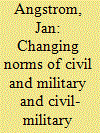

|
|
|
|
|
| Publication |
2013.
|
| Summary/Abstract |
The dichotomy between civil and military is well-established in international political practice. International law, international order, and war are but some of the institutions that rely upon making a distinction between civil and military. The distinction, arguably, is also central for analyses of conflicts worldwide. Almost daily, we are fed stories of atrocities against civilians in conflict-ridden parts of the world. In academic discourse, similarly, several fields of study including most of the debate centering on interpreting modern war relies upon a distinction between civil and military. Both research and practice, however, tend to treat these categories as fixed and global. In this article, I argue - to the contrary - that what constitutes civil and military are malleable norms. This forms a particular challenge to analyses of civil-military relations and it calls for a different categorization of civil-military relations in Weberian ideal types.
|
|
|
|
|
|
|
|
|
|
|
|
|
|
|
|
| 3 |
ID:
140434
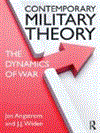

|
|
|
|
|
| Publication |
Oxon, Routledge, 2015.
|
| Description |
viii, 205p.: ill.pbk
|
| Standard Number |
9780415643047
|
|
|
|
|
|
|
|
|
|
|
|
Copies: C:1/I:0,R:0,Q:0
Circulation
| Accession# | Call# | Current Location | Status | Policy | Location |
| 058283 | 355.0201/ANG 058283 | Main | On Shelf | General | |
|
|
|
|
| 4 |
ID:
156613
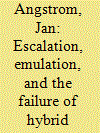

|
|
|
|
|
| Summary/Abstract |
In this article, I argue that hybridization is a contingent result of the dynamics of some conflicts but not others. In particular, faced with opponents with great power, weaker powers seek a situation of asymmetry to gain victory. Drawing on within-case analysis of the conduct of war during the past thirty years in Afghanistan, I demonstrate that what we now consider to be “hybrid” represents an important continuity and strategic option in Afghan warfare. Still, the analysis also demonstrates that choosing “hybrid” has not been a strategy that has worked. Hezb-i-Islami's rather limited attempt for conventionalization of the war against the forces of Dostum and Massoud in 1992 failed and the Taliban's more far-reaching attempt for conventionalization has so far also failed to reap strategic success. This suggests that the threat of hybrid war is inflated.
|
|
|
|
|
|
|
|
|
|
|
|
|
|
|
|
| 5 |
ID:
083037
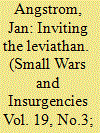

|
|
|
|
|
| Publication |
2008.
|
| Summary/Abstract |
This article examines the role of intervening forces in state-building efforts after state-collapse and civil wars. Based upon a case study from the 30 years of war in Afghanistan, it develops an explanation for failure of state-building attempts drawing upon bargaining theory, macrosociological state-building theory, and strategic thought. The explanation suggests that international state-building attempts condition and shapes a new strategic environment for the local actors. In doing so, the mode of state-building can create incentives for continuing the war or, carried out differently, create incentives for the parties to contribute in building a legitimate state from the rubble of the old state.
|
|
|
|
|
|
|
|
|
|
|
|
|
|
|
|
| 6 |
ID:
106432
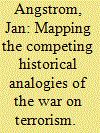

|
|
|
|
|
| Publication |
2011.
|
| Summary/Abstract |
This article maps the historical analogies of the war on terrorism used by the Bush administration. It identifies four historical analogies of the war on terrorism present in the US political and academic discourse since the attacks on 11 September 2001. These are the war on terrorism as: (a) the Second World War; (b) the Crusades; (c) the Vietnam War; and (d) the Cold War. These analogies have been a constant presence in the US discourse, although the analogy with the Crusades has been more prominent in the academic discourse than in the political. There is, moreover, no conclusive pattern of when and how these analogies have been used, suggesting that we cannot use them to evaluate how well the war on terrorism is progressing. This also indicates that the Bush administration, with one exception, was not successful in framing the policy agenda in a certain direction regarding the war on terrorism. Understanding the war on terrorism as a new Cold War, for example, still implies different policy measures such as roll-back and containment.
|
|
|
|
|
|
|
|
|
|
|
|
|
|
|
|
| 7 |
ID:
165362
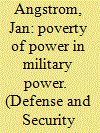

|
|
|
|
|
| Summary/Abstract |
Strategic studies deals intimately with the topic of power. Most scholars in the discipline work with a concept of power as an adversarial zero-sum competition. This is natural and necessary. However, other conceptions of power developed within political science and sociology could enrich strategic studies. Approaching two typical, traditional tasks of strategy – alliance building and war-fighting – this article demonstrates the heuristic mileage of theories of collective power. In particular, we can shed new light on the post-Cold War transformation of NATO as well as state-building as a strategy in counter-insurgencies with new ideas of power. Broadening the palette of theories of power is thus valuable if strategic studies is to prosper as an independent field of study.
|
|
|
|
|
|
|
|
|
|
|
|
|
|
|
|
| 8 |
ID:
115217
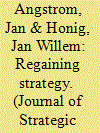

|
|
|
|
|
| Publication |
2012.
|
| Summary/Abstract |
In Western operations in Afghanistan, small European powers escalate in different ways. While Denmark and the Netherlands have contributed to Western escalation through integration with British and US forces, Norway and Sweden have done so by creating a division of labour allowing US and British combat forces to concentrate their efforts in the south. These variations in strategic behaviour suggest that the strategic choice of small powers is more diversified than usually assumed. We argue that strategic culture can explain the variation in strategic behaviour of the small allies in Afghanistan. In particular, Dutch and Danish internationalism have reconciled the use of force in the national and international domains, while in Sweden and Norway there is still a sharp distinction between national interest and humanitarianism.
|
|
|
|
|
|
|
|
|
|
|
|
|
|
|
|
| 9 |
ID:
146910
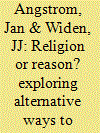

|
|
|
|
|
| Summary/Abstract |
In this article, we address the often ignored issue of quality standards for doctrine. In doing so, we contribute to the existing literature on military doctrine, since much of previous research has focused on outlining the effects of doctrine or the causes of particular doctrinal content, rather than how we should measure its quality. The predominant way of understanding quality of doctrine is based on the rationalist understanding of doctrine as a force multiplier. However, rationalist aims do not necessarily tell us anything about the contents of doctrine. Hence, a doctrine can be seemingly of high quality, but ultimately impede or lead armed forces astray. Rather than focusing on the utilitarian side of doctrine, we suggest that doctrine should mainly be understood as articles of faith or a belief system. And thus the quality of doctrine becomes inextricably linked to military norms and military identity. Writing doctrine thus becomes part of ritual, rather than reason.
|
|
|
|
|
|
|
|
|
|
|
|
|
|
|
|
| 10 |
ID:
060011
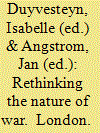

|
|
|
|
|
| Publication |
London, Frank Cass, 2005.
|
| Description |
xii, 247p.
|
| Series |
Cass contemporary security studies series; no. 8
|
| Standard Number |
0415354625
|
|
|
|
|
|
|
|
|
|
|
|
Copies: C:1/I:0,R:0,Q:0
Circulation
| Accession# | Call# | Current Location | Status | Policy | Location |
| 049356 | 355.02/DUY 049356 | Main | On Shelf | General | |
|
|
|
|
| 11 |
ID:
075592
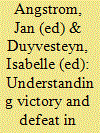

|
|
|
|
|
| Publication |
London, Routledge, 2007.
|
| Description |
xviii, 241p.
|
| Standard Number |
0415404576
|
|
|
|
|
|
|
|
|
|
|
|
Copies: C:1/I:0,R:0,Q:0
Circulation
| Accession# | Call# | Current Location | Status | Policy | Location |
| 052086 | 355.02/ANG 052086 | Main | On Shelf | General | |
|
|
|
|
| 12 |
ID:
160724
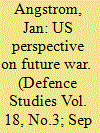

|
|
|
|
|
| Summary/Abstract |
This article addresses why the US in its military operations tends to focus on only one dimension in war – the military narrowly understood. More precisely, in the US case, its armed forces tend to be preoccupied with platforms and understand military capabilities as those that deliver death and destruction. I explain this one-sided understanding of the military dimension in war with how the US armed forces think about future war. How the US understands future war is, in turn, a reflection of how it organizes its long-term defense planning procedures. In particular, by approaching the concept of future as by and large structurally determined, a focus on platforms becomes natural. Investments in weapons systems, too, are more easily motivated to Congress since it is easier to attach a price to developing, for example, a new submarine than it is to attach a price to the cost of developing a military organization that is adaptive, learning and anticipating. The understanding of the future as something that happens whether you like it or not is particularly odd in the US context where of course a central tenet of the American dream is that the individual creates her own future.
|
|
|
|
|
|
|
|
|
|
|
|
|
|
|
|
| 13 |
ID:
165102
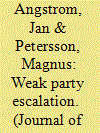

|
|
|
|
|
| Summary/Abstract |
In this article, we develop the strategic rationale behind weak party escalation against stronger adversaries. There are, we suggest, four main strategies: to provoke a desired over-reaction from the stronger adversary; to compartmentalize conflict within a domain in which the weak party has advantages; to carve a niche with a stronger ally, and to forge a reputation of not yielding lightly. Spelling out these different logics contributes to the literature on small state strategies and escalation. It also suggests, contrary to much of the existing literature, that it can be rational for weak parties to escalate against great powers.
|
|
|
|
|
|
|
|
|
|
|
|
|
|
|
|
|
|
|
|
|